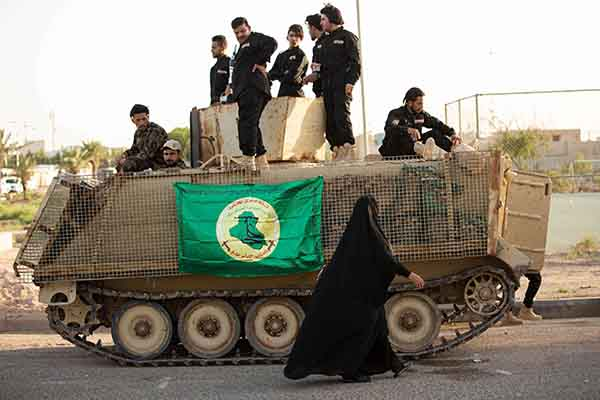
Many Iran-backed militias participated in 2018 general elections via independent lists or general lists.
There are increasing demands in Iraq for political parties with armed wings to be barred from participating in general elections scheduled for next summer in order to ensure participants have an equal opportunity at the polls, which are being viewed with major interest.
Many Iran-backed militias participated in 2018 general elections via independent lists or general lists. The militias secured many seats in parliament after allegedly using weapons to intimidate voters on the outskirts of Iraqi cities, where state presence is generally weak.
The Asaib Ahl al-Haq militia led by Qais Khazali increased its share from one seat in parliament in 2014 to 15 in 2018. Observers expect the militia to double its seats if no actions are taken to stop the spread of smuggled, illegal weapons and increase the strength of state institutions before the next elections.
Activists have launched a popular campaign calling on the United Nations to “blacklist political entities and parties that have armed factions and prevent them from participating in the upcoming elections,” according to a statement released by the campaign.
A record number of new political forces are expected to participate in the early elections, scheduled for June 6, 2021, for two main reasons:
First, the massive protest movement that began in October 2019 and lasted for several months into 2020 inspired many social strata to become more engaged in politics. Smaller parties, in particular, may win some seats in parliament due to the nature of the electoral system.
Second, large parties are set to file candidates in small lists of independents to benefit from a new electoral law that utilises a single ballots system and divides provinces up into multiple districts. Observers believe these factors will transform the new parliament.
At the end of last October, Iraq’s parliament approved a new election law that divides provinces into multiple districts, increasing independents’ chances of securing seats.
Prime Minister Mustafa al-Kadhimi, who has so far kept true to his pledge not to interfere in the electoral process, could also heavily influence the process.
Despite Kadhimi’s pledge, supporters of Iran-backed political parties, movements and militias are circulating news that he is supporting two or three activist groups taking part in the upcoming elections on multiple lists.
Iran-backed media outlets say these activists have been calling for a ban to be imposed on parties with armed wings.
The Iran-backed camp in Iraq claims that the prime minister supports a political current called Al Mahala (The Phase) that includes some of the active faces in the protest movement, notably his adviser Kazem Sahlani and a political analyst close to him, Abdul Rahman Al-Jubouri.
So far, Kadhimi’s team has declined to comment on the news, stressing that the prime minister has not formed any party or political current.
Militia-related entities’ presence in parliament provides political cover for the most violent factions in Iraq when they engage in illegal activity, including violations, abuses and attacks on civil and military interests, public and private property and diplomatic missions.
— Nightmare scenario —
The militias want to maintain the political cover that their presence in parliament provides at any cost, but growing popular anger expressed through the unprecedented protest movement may present a challenge that is too great for them to overcome.
Such opposition could turn into a nightmare for the militias, which fear finding themselves surrounded by people with their freedom of movement restricted in the streets due to growing frustration towards them and Iran, among Shias and the Iraqi public in general.
In the Shia city of Nasiriyah, demonstrators forced Iran-backed parties and militias to close their offices. Some demonstrators were so angry that they demolished the offices of some parties and militias with bulldozers.
In such an environment, the task of Iran-backed Shia militias and parties in early elections will be more complicated than in previous elections, especially if polls are to be conducted according to international standards of integrity and transparency.
The elections are expected to meet such standards if the United Nations and other international parties participate in the monitoring and supervision process.
With the expected heated electoral battle, international observers can play a key role in ensuring fraud and abuses are minimised.
As the electoral battle in Iraq approaches, many fear a wave of violence, with some candidates enjoying the cover of armed militias and others enjoying government support. The political confrontation, observers believe, will likely lead to the victory of the government-supported candidates.
However, there are concerns that parties fearful that Kadhimi’s rise will come at the expense of their influence could attempt to disrupt the electoral process. Iran-backed players have different means to achieve such a goal, including by utilising their positions in power and the influence of their arms.
Kadhimi previously warned that there were attempts to stop elections from being held on time. He said that while Iraq’s transitional government aims to hold early elections by June 2021, some unnamed “parties” are trying to put obstacles in front of the government.
 Eurasia Press & News
Eurasia Press & News



